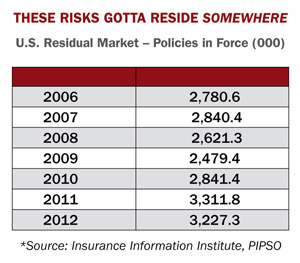The number of policies in the U.S. residual market fell slightly in 2012 but demand remains high—threatening state finances and the pocketbooks of all residents.
An updated report from Robert P. Hartwig, president of the Insurance Information Institute, says that although total U.S. residual market policies-in-force were about 3.2 million from a record 3.3 million in 2011, "this market of last resort remains the market of first choice for many vulnerable, high-risk coastal properties." 
The residual market was originally intended to provide insurance to high-risk policyholders who can't get coverage from the standard market. But many—such as Florida Citizens Property Insurance Corp.—have ballooned to become major insurance providers. Florida Citizens is the largest provider of property insurance in Florida.
Recommended For You
Want to continue reading?
Become a Free PropertyCasualty360 Digital Reader
Your access to unlimited PropertyCasualty360 content isn’t changing.
Once you are an ALM digital member, you’ll receive:
- Breaking insurance news and analysis, on-site and via our newsletters and custom alerts
- Weekly Insurance Speak podcast featuring exclusive interviews with industry leaders
- Educational webcasts, white papers, and ebooks from industry thought leaders
- Critical converage of the employee benefits and financial advisory markets on our other ALM sites, BenefitsPRO and ThinkAdvisor
Already have an account? Sign In Now
© 2025 ALM Global, LLC, All Rights Reserved. Request academic re-use from www.copyright.com. All other uses, submit a request to [email protected]. For more information visit Asset & Logo Licensing.








